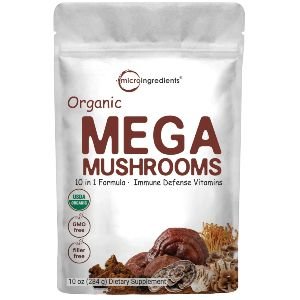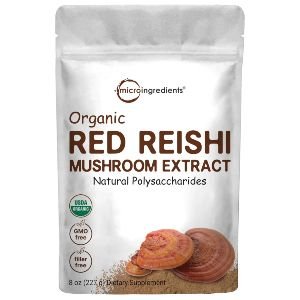9 Maitake Mushroom Benefits Backed By Science, Side Effects & Nutrition Facts
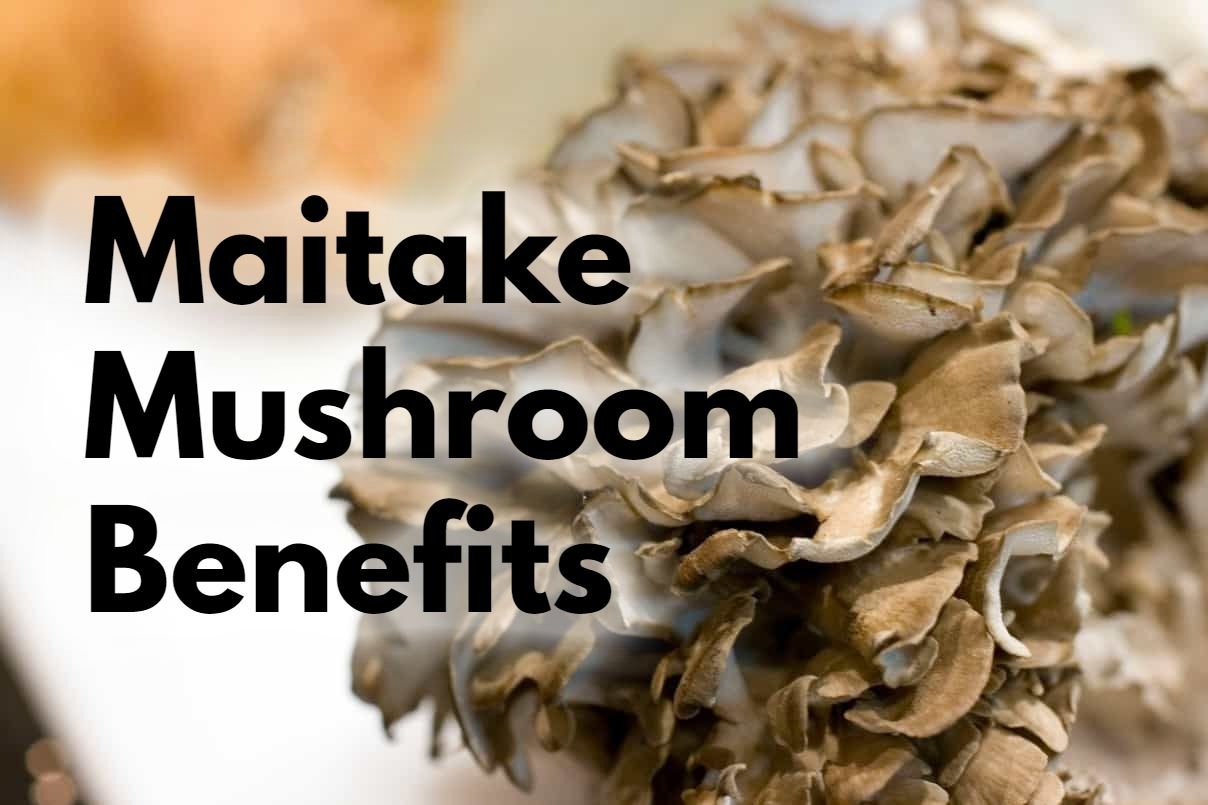
Are you looking for a delicious and nutritious way to support your healthy lifestyle?
Look no further than maitake mushrooms (Grifola frondosa)!
These flavorful fungi – also known as Hen of the Woods – have been used for centuries in traditional medicine and cuisine, and recent scientific research has started to shed light on their potential health benefits.
From supporting immune function and healthy blood sugar levels to reducing inflammation and providing important nutrients, maitake mushrooms offer a range of potential benefits for your overall health and well-being.
In this article,I’ll explore the scientific literature on maitake mushroom benefits and how you can incorporate this tasty fungi into your diet.
But before we jump straight to maitake mushroom benefits, let’s learn more about what maitake mushroom is and its origin.
What Are Maitake Mushrooms
Maitake mushrooms are a type of edible fungi that belong to the family of polypores. Polypores are a type of fungi that have pores or tubes on the underside of their caps instead of gills. They are also known as bracket fungi due to their shelf-like appearance.
Maitake Mushrooms are commonly known as “Hen of the Woods” due to their appearance, which looks like the feathers of a hen.
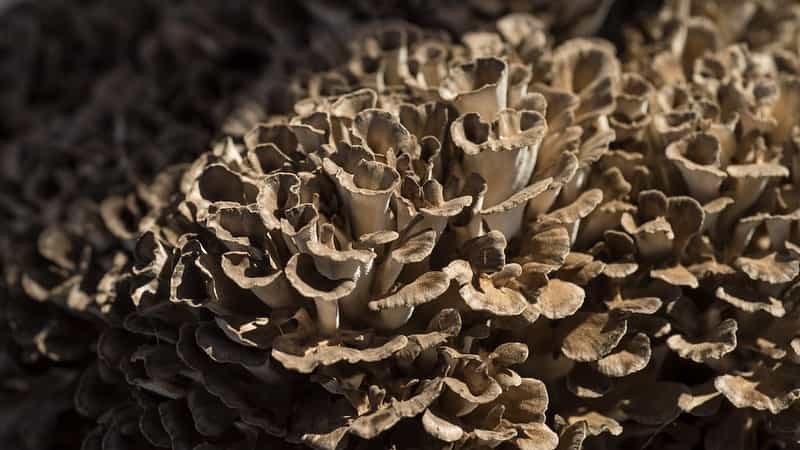
In addition to “Hen of the Woods,” maitake mushrooms are also known by other names, including “Sheep’s Head” and “Ram’s Head” due to their shape and texture.
These mushrooms (along with almost all other mushrooms with fancy name, like Reishi etc) are native to Japan, where they have been used for centuries in traditional medicine and cuisine.
Nowadays, they are also grown in other parts of the world as well. Maitake mushrooms grow at the base of oak trees and other hardwoods in the fall and are typically harvested before the first frost.
They have a meaty texture and a deep, earthy taste, making them a popular component in soups, stir-fries, and other cuisines.
Maitake mushrooms are also available in supplement form and are used for their potential health benefits which we will be analyzing below.
Maitake Mushrooms Benefits
Maitake mushrooms have been used for centuries in traditional medicine to promote overall health and well-being. Some of Maitake Mushrooms benefits that are backed by scientific literature are:
1. Boosts The Immune System
One of the most studied health benefits of maitake mushrooms is their ability to support the immune system.
This is because Maitake mushrooms contain beta-glucans, a type of polysaccharide that has been shown to stimulate the activity of immune cells, such as macrophages and natural killer cells.
These immune cells are responsible for recognizing and destroying abnormal cells in the body, including cancer cells.
Several studies are rogeting that consuming maitake mushrooms improves immune function and reduce the risk of infections and chronic diseases.
In an article published in the journal Annals Of Translational Medicine, researchers looked at how extracts from Maitake and Shiitake mushrooms could boost the immune system. They had people take these extracts orally for two weeks and then measured different parts of their immune response.
They found that the Maitake and Shiitake combination had the biggest impact, making the immune system more active. Maitake extract alone also strongly boosted the immune response, followed by Shiitake alone.
These mushroom extracts really pumped up both the body’s cellular immune defenses (like natural killer cells) and its chemical immune defenses (like cytokines, which are immune system messengers).
Overall, it looks like Maitake and Shiitake mushroom extracts can give your immune system a solid boost, especially when taken together. The researchers think these extracts could be useful for helping avoid or recover from illness.
2. Fights Inflammation
Maitake mushrooms may also have anti-inflammatory properties. Chronic inflammation is a major risk factor for many chronic diseases, such as heart disease, cancer, and Alzheimer’s disease.
A review study published in the Clinical Complementary Medicine and Pharmacology (CCMP) journal looked at how mushrooms can reduce inflammation in the body.
The researchers reviewed previous studies on the topic and found that mushrooms contain peptides, polysaccharides, terpenes, sterols, fatty acids, and phenols that can block inflammation.
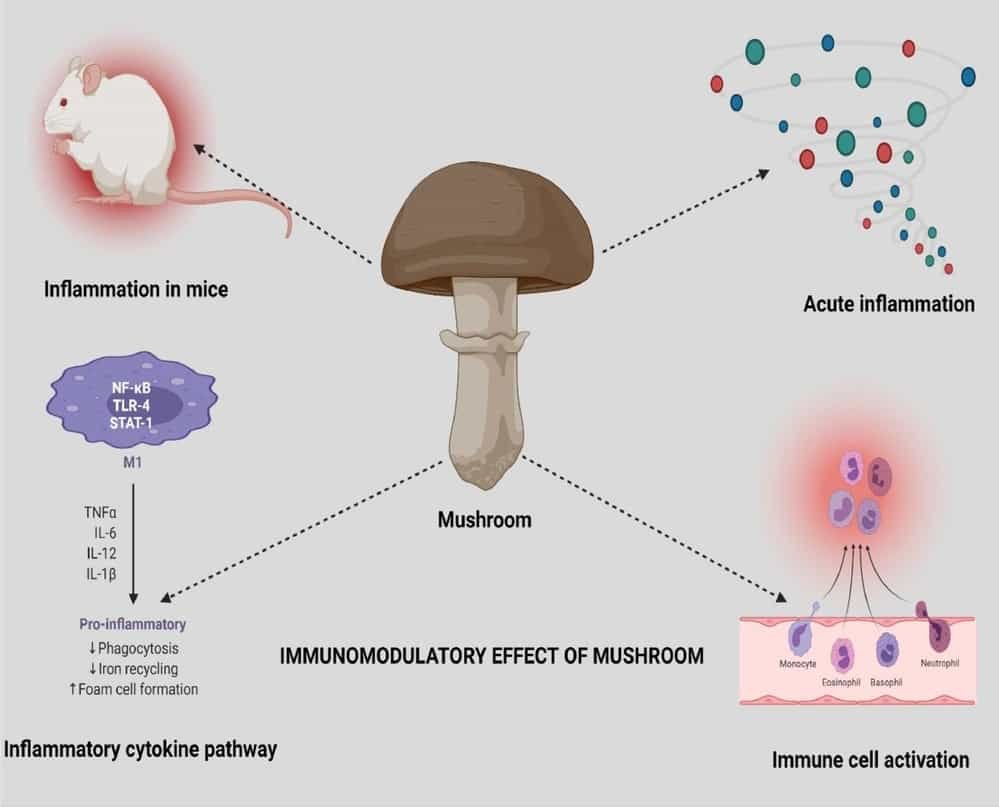
These compounds are able to inhibit inflammatory responses in cells and animals. Overall, the research shows that mushrooms have strong anti-inflammatory effects and could potentially be developed into new anti-inflammatory treatments.
In another study published in the International Journal of Medicine and Medical Research, researchers tested whether Maitake mushroom extract reduces inflammation in rats with acetaminophen-induced liver damage.
They gave rats large doses of acetaminophen to simulate hepatitis, causing increased levels of a pro-inflammatory cytokine and C-reactive protein, and decreased anti-inflammatory cytokines. Administering the mushroom extract brought these levels back to normal, reducing signs of inflammation.
The extract seems to have anti-inflammatory effects, at least in this rat model of liver injury.
3. Blood Sugar Balance
Another potential benefit of maitake mushrooms is their ability to support healthy blood sugar levels.
Research has shown that maitake mushrooms may help improve insulin sensitivity and glucose metabolism, which are important factors in maintaining healthy blood sugar levels.
More specifically, a study found that a mushroom extract helped control blood sugar in diabetic rats.
The extract lowered blood sugar levels, improved insulin sensitivity, and improved cholesterol. It also reduced inflammation in fat tissue and improved the mix of gut bacteria.
The researchers think the mushroom extract works by reducing inflammation and improving gut health, which then helps with blood sugar control and insulin resistance.
In another study, scientists injected male rats with streptozotocin to induce type-1 diabetes and then divided them into four groups.
One group ate straight rat chow while the other three groups ate rat chow with added treatments of either gliclazide, pioglitazone, or maitake SX. (Maitake SX is a fraction derived from the Maitake mushroom).
The results showed that maitake SX consistently enhanced insulin sensitivity, lowered blood pressure, and decreased activity of the renin-angiotensin system.
This suggests that maitake SX could be a useful treatment for glucose-insulin metabolism and elevated blood pressure in type-1 diabetes.
4. Lowers High Blood Pressure
In an anima study, Maitake mushrooms have been found to lower high blood pressure and have anti-hypertensive properties.
More specifically a study published in the journal Molecular and Cellular Biochemistry back in 2002, Maitake mushroom powder and extracts were tested on hypertensive and diabetic rat models.
Whole powder and a water extract lowered blood pressure in fatty rats, while an ether extract decreased it in hypertensive rats, possibly via the renin-angiotensin system.
The ether extract also improved cholesterol and kidney function in hypertensive rats. In fatty rats, the whole powder and ether extract reduced insulin and blood sugar, and the water extract showed similar trends.
Adding chromium to the water extract amplified its benefits. These results suggest Maitake has potential for blood pressure and diabetes, in different ways for different animals.
5. Kills Cancer Cells
Maitake mushrooms may help prevent breast cancer – according to a study published to the scientific journal, Cancer Medicine.
Researchers gave mice a Maitake extract called D-Fraction Pro4X for 15 days. When they injected the mice with breast cancer cells, over 60% didn’t develop tumors!
The extract seemed to stop the cancer from spreading and forming new blood vessels.
Another Maitake extract prevented cancer in only 26% of mice. The Pro4X extract helped the mice live longer too. This research shows Maitake mushrooms could potentially help prevent breast cancer in humans as well.
Another review study published in the journal Alternative Medicine Review, looked at a maitake mushroom extract’s effect on human cancer patients.
They gave patients the extract along with chemotherapy and measured their immune cells. Patients with liver, breast, and lung cancers saw significant improvement or cancer regression.
Leukemia, stomach, and brain cancer patients improved slightly. When combined with chemo, immune cells improved more than with chemo alone.
Finally, in a study published in the journal, Biological And Pharmaceutical Bulletin studies the effect of MD-Fraction from maitake mushroom on lung metastasis in a mouse model.
The administration of MD-Fraction 2 days before tumor implantation suppressed lung metastasis of colon-26 carcinoma and B16/BL6 melanoma cells by enhancing IL-12 production from antigen-presenting cells, activating NK cells and increasing cytotoxicity, and inhibiting tumor cell adhesion to vascular endothelial cells.
These results suggest that MD-Fraction has anti-metastatic activity by activating immune cells and suppressing tumor cell adhesion to endothelial cells.
6. Lower’s Cholesterol
A Japanese study concluded that mushroom fibers lowered cholesterol in rats. Four groups of rats ate diets with different fibers.
Only enokitake fiber increased liver LDL receptors and lowered HDL. All mushroom fibers raised good gut bacteria and their waste products.
Cholesterol in blood and liver dropped for enokitake and maitake fiber groups. Their cholesterol dumping in poop increased too.
Bottom line, it seems that some mushrooms can battle cholesterol in a natural, diet-friendly way by changing gut bacteria and how the body processes fat and cholesterol.
In another Japanese study, researchers studied the effects of Grifola frondosa on cholesterol levels in mice fed a diet containing 1% cholesterol.
Mice were divided into three groups: one group fed a normal diet, another fed the high-cholesterol diet, and a third fed the high-cholesterol diet with 10% G. frondosa powder.
The mice on the high-cholesterol diet had increased levels of cholesterol in their liver and plasma compared to the normal diet group.
However, mice on the high-cholesterol diet with G. frondosa had lower plasma cholesterol levels. The study also found that G. frondosa promotes fatty acid oxidation and suppresses a gene related to arteriosclerosis.
7. Promotes Fertility
A small Japanese study found that an extract from maitake mushrooms may help women with PCOS ovulate.
Researchers gave 72 women either the maitake extract, clomiphene, or both for 3 months.
About 77% of women on maitake extract ovulated, compared to 94% on clomiphene.
However, when combined, 100% of women on maitake and 75% on clomiphene ovulated.
While promising, more research is needed. The maitake extract requires taking 9 pills a day, which could be hard for patients to stick with long-term.
8. Has Anti Allergic Effects
No more anti-staminic drugs. Eat Maitake instead.
A study found that Maitake mushrooms may help reduce allergy symptoms. When allergens enter the body, mast cells release histamine and cytokines that cause inflammation.
But Maitake extract stopped mast cells from releasing as much histamine and cytokines. In lab tests, Maitake extract was added to mast cells, then the cells were exposed to an allergen.
The Maitake cells released less histamine and had lower levels of cytokines. So Maitake mushrooms could help relieve allergy symptoms like hay fever by reducing the body’s inflammatory reaction.
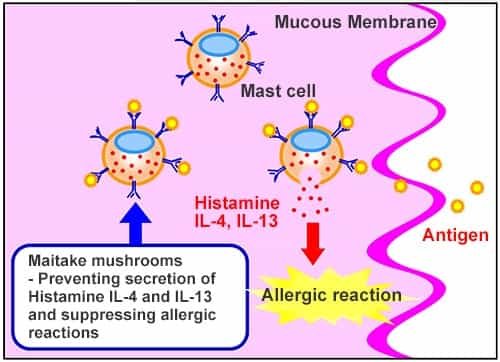
9. Packed With Nutrients
Finally, maitake mushrooms are a good source of several important nutrients, including potassium, vitamin B6, and vitamin D.
These nutrients play a role in many different aspects of health, including bone health, cardiovascular health, and cognitive function.
Maitake Mushrooms Potential Side Effects
While Maitake mushrooms are generally considered very safe, some people may experience minor side effects. The most common ones are:
- Nausea or upset stomach. Maitake mushrooms are rich in fiber, which can cause gastrointestinal issues in some people, especially if consumed in large amounts. Start with a small amount and gradually increase to allow your body to adjust.
- Headache. Some people report experiencing headaches after eating Maitake mushrooms. This may be due to changes in blood sugar or blood pressure. Drinking plenty of water can help prevent headaches.
- Skin rash. Rarely, people can experience an allergic skin reaction to Maitake mushrooms. Discontinue use if a rash develops.
- Dizziness or vertigo. Maitake mushrooms may lower blood pressure in some individuals, which could lead to lightheadedness or dizziness. Use caution if you already have low blood pressure.
- Interactions with medications. Maitake mushrooms can interact with some medications, including diabetes medications and blood pressure medications. Talk to your doctor before consuming Maitake mushrooms if you are on any regular medications.
Overall, Maitake mushrooms are considered very safe for short-term use with minimal risk of serious side effects.
Maitake Mushrooms Nutrition Data
Here’s a handy table with Maitake Mushroom Nutrition Data as take from USDA’s website.
| Nutrient | Amount per 100 grams | % of Recommended Daily Amount |
|---|---|---|
| Calories | 34 | |
| Carbohydrates | 7.98 g | |
| Protein | 2.24 g | |
| Total Fat | 0.23 g | |
| Saturated Fat | 0.04 g | |
| Monounsaturated Fat | 0.01 g | |
| Polyunsaturated Fat | 0.12 g | |
| Omega-3 Fatty Acids | 0.02 g | |
| Omega-6 Fatty Acids | 0.1 g | |
| Dietary Fiber | 3.6 g | |
| Sugar | 2.53 g | |
| Vitamin C | 2.6 mg | 3% |
| Thiamin | 0.077 mg | 6% |
| Riboflavin | 0.356 mg | 27% |
| Niacin | 5.525 mg | 34% |
| Pantothenic acid | 0.652 mg | 13% |
| Vitamin B6 | 0.116 mg | 9% |
| Folate | 18 mcg | 5% |
| Choline | 12.4 mg | |
| Betaine | 0.7 mg | |
| Vitamin B12 | 0 mcg | |
| Vitamin A | 0 IU | |
| Vitamin E | 0 mg | |
| Vitamin K | 0 mcg | |
| Calcium | 6 mg | 0.6% |
| Iron | 0.68 mg | 8% |
| Magnesium | 12 mg | 3% |
| Phosphorus | 70 mg | 10% |
| Potassium | 318 mg | 7% |
| Sodium | 7 mg | |
| Zinc | 0.77 mg | 7% |
| Copper | 0.158 mg | 18% |
| Manganese | 0.105 mg | 5% |
| Selenium | 0.7 mcg | 1% |
Note: % of Recommended Daily Amount is based on a 2000 calorie diet for an adult. The values may vary depending on age, gender, and physical activity level.
How To Use
Maitake mushrooms are delicious and perfect for cooking.
I personally love using maitake mushrooms in stir fries, pasta dishes, and risotto.
To prepare maitake mushrooms, first brush or wipe them clean to remove any dirt. Then, remove the stems, which can be tough, and separate the mushroom caps into smaller clusters.
Maitake mushrooms are also perfect for sautéing in butter or olive oil and serve them as a side dish to your meals. Cook them over medium-high heat until they soften and turn golden brown.
You can add any seasonings you like – like salt and pepper for example or add garlic, thyme, or rosemary for extra flavor (garlic is my absolute favorite).
Maitake mushrooms also pair great with creamy ingredients like cream, milk, or cheese.
Whether you want to keep things simple or get creative, maitake mushrooms will add tons of rich, earthy flavor to your cooking.
Conclusion
- Maitake mushroom is a type of medicinal mushroom that has been traditionally used in alternative medicine for various health benefits.
- Scientific studies have shown that maitake mushroom has anti-cancer properties, helps regulate blood sugar levels, enhances the immune system, and lowers cholesterol levels.
- Maitake mushroom is safe for most people when consumed in food amounts or as a dietary supplement, but it may interact with certain medications.
- Maitake mushroom can be found in various forms, including supplements, powders, extracts, and teas, and can be added to a healthy diet as a nutritious and tasty ingredient.
- Overall, maitake mushroom appears to have numerous potential health benefits backed by scientific evidence and may be a valuable addition to a healthy lifestyle.
Read Next


